- Home
- Parris Afton Bonds
AT FIRST SIGHT: A Novella
AT FIRST SIGHT: A Novella Read online
A T F I R S T S I G H T
By
PARRIS * AFTON * BONDS
Published by Paradise Publishing
Copyright 2017 by Parris Afton, Inc.
All Rights Reserved
Cover design by Jerry Jackson, Inc.
This is a work of fiction based on history and a product of the author’s imagination. No part of this novel may be used or reproduced in any manner whatsoever without written permission except in the case of brief quotations embodied in critical articles and reviews. This e-book may not be re-sold or given away.
FOR MY DAUGHTER-IN-LAW
ADRIENNE BRADSHAW BONDS
§§ CHAPTER ONE §§
Was it safe?
Five years before, that frightful, frigid January morning of 1649, both her father’s and brother’s heads had rolled on Whitehall Palace’s chopping block, along with those of King Charles’s and others.
Not waiting to see if her head was next, Lady Evangeline Bradshaw fled England with the family’s remaining gold and silver crowns sewn into her furred muff, cloak lining, and front panel and hem of her petticoat – making anything short of mincing steps practically impossible.
The first ship she could book passage on had been bound, not for the Continent, but, alas, for the Colonies. Yet even here, in this remotest place on earth one could imagine, she did not feel safe. And now she had to be concerned for others, as well.
She barred the Virgin Queen Tavern’s doors, front and back. The inn’s location had appealed to her because the closest settlement, discounting a scattering of Danish blockhouses, Finnish and German farms, and a few tobacco plantations, was some twenty miles south – near the confluence of the South and Brandywine Rivers.
The nearly nine-hundred colonists of New Sweden Company’s Fort Christina were more indulgent when it came to Christmas matters than the Dutch of New Amsterdam – thankfully, 100 miles to the north – and the forbidding and dour Puritans and Pilgrims, even farther north, in the New England colonies.
Surely, that late in the evening no guest would come seeking a room upstairs, all three of which were empty. Outback, Bonnie Charlie, young Rasannock, and Gantu were warmly bedded down in the scullery, and Millie, the milk cow, and the mule Molly were sheltered in their stable stalls.
Upstairs, in her own bedchamber, Evangeline knelt and opened the great red lacquered chest, next to the carved wallpress. Quietly, so as not to disturb her bedchamber’s other occupant, sleeping blissfully, she removed the blanket wrapped objects tucked away at the chest’s bottom.
Almost reverently, she withdrew the wooden nativity set’s figurines and the three gifts – a whittling knife for old Bonnie Charlie; a beaver hat for bald Gantu; and a red hooded cloak for flamboyant Rasannock.
The fur-lined cloak had been hers. But where would she wear such a luxuriant garment these days? The Puritans and Pilgrims to the north would burn it – and her.
Next, with the gifts stored in her basket, she crept downstairs, where she draped both the mantle and the doorways with garlands of holly and ivy and mistletoe. Her father and brother’s executioner had banned these traditional Christmas decorations. More precisely, Oliver Cromwell and his Roundheads had banned Christmas.
In London, soldiers were ordered to patrol the streets and take, by force if necessary, food being cooked for a Christmas celebration. The smell of a roasting goose could land its unfortunate cook in the stocks. Which reminded Evangeline that the brace of partridges Rasannock had returned with earlier that day needed to be skewered on the spit, come dawn.
Plucking the downy feathers had been a tedious and messy task at which her hands had no experience prior to her arrival in the colonies – but a task well worth her effort. A savory smelling partridge roasting on Christmas – best she could probably ever do to thumb her nose at both the bloody Roundheads and Puritans.
She had purchased the ramshackle two-story cabin from a Dane who, goaded by his wife’s scalping, had retreated to his homeland. A year later, with the help of her three, self-proclaimed, male protectors, she had added on the serviceable kitchen. Replete with an oven, its fireplace was large enough to skew an entire deer, and its brick floor she had helped lay.
She tossed another stick into the oven and reclosed its iron door. The cranberry and clove sauce was already thickening in a fire-warmed pan. She still had her dough to set. Up all night she would be, preparing the Christmas dinner.
Taking the tin canister from the cupboard, she ladled out enough flour for the Christmas cake – and paused. No, she had not been mistaken. The clanking of the tavern’s heavy brass knocker – someone was seeking admittance.
The ladle hovered over the ceramic bowl. She could turn the caller away – but the funds of the tavern, empty of lodgers that night, were perilously low. And it was Christmas. Still, who on God’s green earth could be calling that late?
Wiping her flour-dusted hands on her white apron, she crossed the brick floor and opened the kitchen’s half door to the main room. From the stone wall above its fireplace, she took down one of the paired, long pistols and hid it in the limp folds of her skirt.
At one time, that skirt had been extended by flounces of lined and quilted petticoats, their hems decorated with gold braid and trimmed with point de Venise. Her décolletage had been cut extremely low to expose the swell of her maiden’s breasts. Now, a Puritan’s starched white smock and collar shielded those breasts the Roundheads and Puritans considered shameful.
Forever gone for her were the elaborate velvets, satins and silks with their fancy frills, laces, buttons, bows, and buckles. At least, none were visible. But her undergarments – her chemise and pantalettes’ lace and ribbons – in these she took forbidden feminine pleasure.
As it was deemed unseemly for the hair to be shown, hers was usually hidden by a tight-fitting coif, which, at this late hour, she had removed to indulge in the comfort of freedom, also forbidden.
At the opposite end of the kitchen, past the ordinary’s tables, and beyond the staircase, she cautiously approached the heavy iron-strapped front door.
She worried not about hostile Indians. She had won the protection of the Lenape-Delaware, the area’s predominant Indian population. Four years before, she had snatched the sachem’s fifteen-year-old nephew from the ravages of spotted fever. The striking young man now considered himself her guardian, elbowing for that special status, whenever Rasannock could, the fur trapper, toothless old Bonnie Charlie, and brick maker and iron forger, the runaway African slave, Gantu.
The modest ordinary squatted on the primitive road between Jamestown and Boston, where it crossed a path, worn through deep forests by the Delaware Indians as they headed westward to hunt. Behind the inn flowed the South River, her source of baths at dawn, given adequate weather.
The road always stood in peril of being repossessed by that weather and the forest – and was traveled by a few sojourners afoot, an occasional express rider, and, even more rarely, a wagon or cart. A visit this late in the evening by any of the three was highly unlikely.
It was the Roundheads who worried her. Cromwell’s tentacles continued to snake afar to exterminate those who had escaped his executioner’s axe. Her hand clamped on the door’s heavy bar, she inquired softly, “Who calls?” She hoped it was only her imagination – or hoped the caller would possibly not hear her and go away.
“Is there room at the inn?” responded a male voice that was cold steel glazed with heated honey.
Apprehension paralyzed her grip on the bar. “Who calls?” she repeated.
“A pilgrim seeking shelter,” the muffled voice fired back.
Her mind riffled through her options. If the caller was foe, she could e
xpect no assistance from within the tavern. In the scullery behind, her personally designated, sleeping protectors would not likely hear her screams. But, of all days, could she in good conscience turn away a traveler on Christmas Eve? Besides, there was the prospect of lodging payment to raise the inn’s mud-low coffers.
She lifted the latchstring. The door squeaked on rusty hinges. Frigid air howled over her, and the candles guttered wildly in their sconces, and she shivered, as if her body was feeling this was one of those life-changing moments.
The vertical slit provided her view of a tall man in a plain russet cloak, one flap thrown over his shoulder to reveal a pistol, dirk, and rapier at his short-waisted leather doublet. His wide-brimmed hat, pinned to one side, revealed a glimpse of a strong-willed mouth and an iron-set jaw, its cleft chin punctuated with a dark, devilish tuft of hair the size of her thumb pad.
Bucket-top boots made his hose-encased legs appear even longer than they already were. But it was the length of his hair she sought to determine.
Not that length was an assured giveaway as to what political affiliation the man might adhere. Unlike Cromwell, with his shorn locks, his generals, and many of the Roundhead adherents, for that matter, tended to wear their hair at much the same length as their Royalists counterparts – in long, flowing ringlets. This man did wear his locks, as dark brown as the leather saddlebags flung over one forearm, as long as any Royalist.
“You are?” she asked. He was obviously a gentleman, despite his puritan, travel-stained clothing. His very stance proclaimed authority.
He swept his hat off – all it needed was an ostrich plume, and she might have mistaken him for a Royalist and acquiesced at once. But there was no mistaking her extraordinary reaction to him. Handsome he was, aye, but no more so than the gallants she had crossed paths with at court functions. Something inordinate about him caused her heart beat to accelerate, as it would when an adversary was near.
His bow was curt. “Adam Sutcliff., a weary wayfarer.”
The name meant nothing to her, nor signified any danger. Still . . . “What brings you along the highway so late and so far from any hamlet?”
“Tis bitter cold my bones are. For a hot toddy, a warm fire, and a soft bed, I shall regale you with the misfortunes of my travels that bring me here this late of night.”
His brown eyes twinkled, so how could she mistrust him? Her mother’s eyes had twinkled just so, before she had died of pleurisy when Evangelina had yet to reach the age of seven. Except her mother’s eyes had been blue, like hers. The pure blue of a cloudless sky. His were the dark brown of turbulent seas.
Relenting, she opened the door. Wide enough only for him to slip his lean length inside. She judged him to be in his late-twenties or early thirties, no more than a decade older than she at the utmost. Long gloved fingers dusted the snowflakes from his cloak. His nostrils flared – more likely at the aroma of her holy day cooking than the lavender scent she used personally.
Then he fixed his appraising gaze on her. “I have identified myself. And you are?”
She almost blurted, ‘The Lady Evangeline Bradshaw.’
“Mistress Eve Wainwright. Proprietress of the Virgin Queen Tavern.” The curtsy she affected was nigh nonexistent. The slightest bob of her head, at that time of night unadorned by a coif, was more that of royalty dismissing a minion. “Your cloak.”
His grin barely twitched the ends of his mouth. “I can hang it on the pegboard myself – seeing as you are encumbered with that damnably heavy horse pistol.”
Despite the blustering cold that had ushered him inside, she felt the heat of a blush rise from her throat to suffuse her cheeks. She lowered her lids. “Protection is ever necessary in the wilderness, sire.”
“Adam, prithee – if we are to be spending this night in each other’s company.” He hung his cloak, then, removing his floppy hat, he beat it across his thigh. Snowflakes flurried. “I took the liberty of stalling my mount, with a nosebag, in your stable.”
She replaced the pistol above the mantle, only to find, as she turned from the crackling fire, that he was regarding her closely. Uneasy, she nevertheless held out her hand. “Your saddlebags – I shall put them in your bedchamber upstairs.”
“Nay, these I shall keep with me.” He tossed the saddlebags on the nearby gaming table, next to the fireplace. They made a weighty thud. What looked to be a sugarcane stalk – apparently his emblem of ownership – was tooled into the weathered leather. He stripped off soft gloves of fine kid. “But I could use that toddy.”
Relieved for an excuse – and the kitchen’s half-door – to put distance between her and the man, she nodded and retreated. She sat a pan of butter she had churned only that morning to warm next to the flickering flames and took out the precious sack of maple sugar and the jug of rum from the cupboard.
When she turned, she found Adam Sutcliff watching her, his hands braced on either side of the half-door’s frame. There was something about him that reminded her of the Cavaliers of King Charles’s court. That should have eased her apprehension. But there was also that swashbuckler element about him.
“Then grace me with your travails,” she said, her voice limed with feigned airiness. She returned to the mixture of rum and sugar she was adding to the pan’s melted butter. The spot between her shoulder blades burned with his stare.
“I have been commissioned to purchase land in the Indian territory beyond,” came his unique voice. “But, t’would seem the elements conspire to delay me. A floundering ship. My livery mount threw her shoe. Inclement weather. And no room to be had anywhere . . . until I found you.”
At his phrasing of the last, she paused, then looked over her shoulder. Her smile was amiable enough. “Purchase land – for whom?”
“An enterprise involving many.”
An emissary he was? The Dutch, in constant friction with the Swedish, and the Spanish were competing with the French and English for the new continent’s domination. If he represented Cromwell’s England . . .
As she asked the next question, she watched his eyes. For her, eyes were more of a tell-tale than gestures. “Oh? Who is at the helm of this enterprise? Who commissioned you?”
As if he had not heard her, his gaze seemed to wonder over the kitchen aimlessly, then took in the holly and mistletoe draped on the sill above his head. “A festive occasion, is it?”
Her heart skipped a beat. “Have you hunger?” With inordinate attention, she cleaned her hands on the dish towel slung over one shoulder. “Your tavern bill includes a meal.”
“Aye, that I do.”
“I have leftover venison and pumpkin stew. Have a seat at one of the tables, please you, sire.”
“Adam, Eve.” His smile sank dents beneath each craggy cheekbone. “An interesting twist of irony, our given names, is it not?”
Incensed that he could address her so familiarly, she ignored his question, as she also ignored his dictum to use his given name.
She carried into the main room a tray, laden with a small basket of apples from the orchard along with a bowl of warmed stew, strong yellow cheese, and a slice of gingerbread. Food that she could ill afford to share that winter.
By that time, he had already installed himself at the gaming table, with one boot resting proprietarily on another chair. The boot’s heavy spur threatened to rip the chair’s rush-bottomed seating.
“Prithee, join me,” he said, delivering what might be interpreted as a warm, inviting smile and a flourishing sweep of one arm with its billowing white sleeve.
Disturbingly sensuous, his smile was. But not enough to catch her off her guard. Fretting, she thought of the three gifts still bundled, along with the wooden nativity scene, in the basket by the hearth – only feet from the gaming table. He had already taken note of the holly and mistletoe. She would have to proceed most cautiously.
“I have no time to dally. I have three servants who will be wanting a meal tomorrow.” This, to reinforce she was not alone.
&nb
sp; “Ahh – those sadly plucked partridges on the work table.” He dipped a wooden spoon into the stew, closed his eyes as he savored its taste, then opened them to fasten an amused gaze on her for an undue amount of time. She shifted beneath his reflective regard. “Heavenly,” he said, at last. “Your cooking. And you can cook their meals while we game away the night.”
Standing in front of him, chaffed hands braced on hips too slender these days, she cocked her head. Gone was her amiable smile. “Game away the night?”
His abundant curling hair swished the collar of his buff coat, as he nodded indulgently at the gaming table’s chessboard, dice, and worn deck of cards. “Aye. Have you anything else to do tonight but cook?”
Until she knew better his allegiances, dared she alienate him? If a game was afoot, best she learn its rules. She shook her head. “Nay.”
“Splendid. Then you can attend to those kitchen tasks between chess moves – I tend to deliberate a long time before making up mind about something.”
“And my instincts know immediately.”
“Impulsive, are you?” Wooden spoon suspended in one hand, he reached with the other to dip inside one of the saddlebags. Flipping it open, he scattered a fistful of glittering coins to decorate the table top. “You will be richer by one-hundred Spanish gold doubloons should you win in a game of chess.”
One-hundred Spanish gold doubloons – when food and lodging was bartered with mere tobacco notes, farm goods, and the inflationary Swedish riksdaler!
“And should I lose?” Not that she would lose. As a young girl at King Charles’s court, she had held her own at chess with the best of his courtiers. “I have nothing to wager.”
“Ahhh, but you do.” He crossed one booted foot over the other on the chair and regarded her gravely. “Your services.”
She stiffened, not thinking she had heard aright. But his sardonic smile told her she had. Her breath nearly hissed from her throat. “And exactly what services would you require – should I lose?”

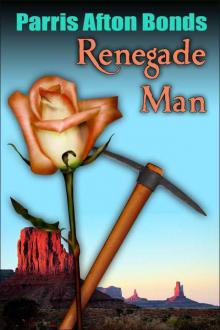 Renegade Man
Renegade Man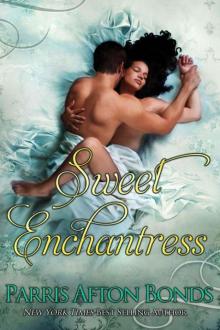 Sweet Enchantress
Sweet Enchantress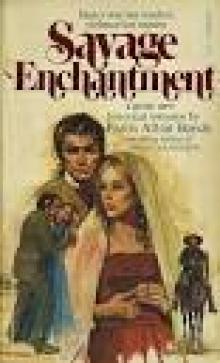 Savage Enchantment
Savage Enchantment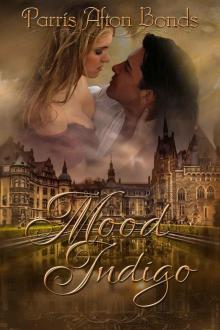 Mood Indigo
Mood Indigo Indian Affairs (historical romance)
Indian Affairs (historical romance)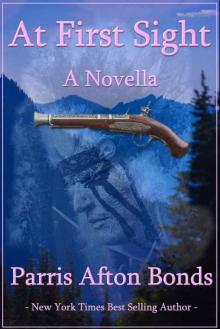 AT FIRST SIGHT: A Novella
AT FIRST SIGHT: A Novella The Maidenhead
The Maidenhead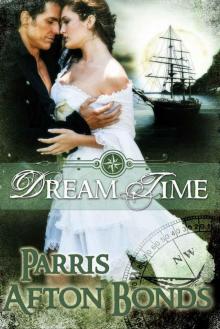 Dream Time (historical): Book I
Dream Time (historical): Book I Made For Each Other
Made For Each Other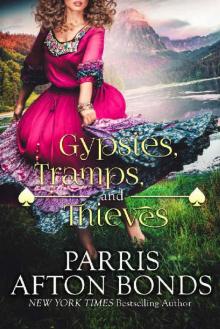 GYPSIES, TRAMPS, AND THIEVES
GYPSIES, TRAMPS, AND THIEVES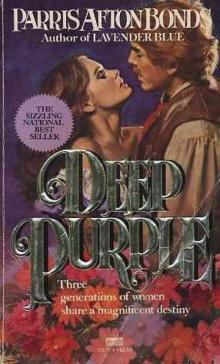 Deep Purple
Deep Purple Tame the Wildest Heart
Tame the Wildest Heart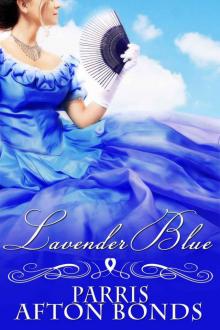 LAVENDER BLUE (historical romance)
LAVENDER BLUE (historical romance)